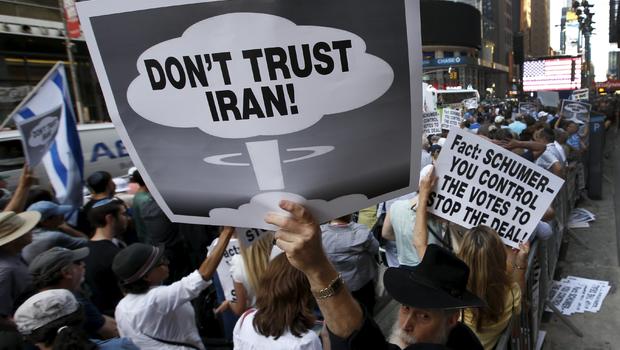Congress has the right to see the full negotiating record, not just the final product or strategically leaked details.
The principal question about the Iran nuclear agreement is whether U.S. negotiators really got what they needed to prevent the Islamic Republic from joining the nuclear club. To opponents, America’s negotiators were bamboozled by crafty Persian merchants who bought more time to complete a bomb. To supporters, the U.S. and the rest of the so-called P5+1 got what was necessary and in a manner binding under international law.
 |
John Kerry and his nuclear-negotiation counterpart,
Iranian Foreign Minister Javad Zarif, at the United
Nations in April. Photo: Brian Snyder/AP
|
If only Congress, whose members must soon vote for or against the agreement, could look behind the curtain to see how the negotiations played out and who got the better of whom. Well, actually, they can. In our age of digital files, recordings, emails and text messages, the record of the nuclear negotiations is probably both voluminous and easily accessible. Congress has a right to see the negotiating record. All of it, not just bits and pieces that are leaked at the convenience of the administration. U.S. diplomatic history proves as much, as I discovered long ago.
In the mid-1980s, fresh out of law school and a clerkship, I worked in the office of then State Department Legal Adviser Abraham Sofaer. Judge Sofaer (he’d been a federal district-court judge before taking the job at State) had to explain to the Senate the Reagan administration’s position on the 1972 Anti-Ballistic Missile Treaty with the Soviet Union. In particular, Judge Sofaer defended the Reagan administration’s position that the ABM Treaty allowed development of the Strategic Defense Initiative, aka Star Wars. The Democratic-controlled Senate opposed SDI and argued that the ABM Treaty barred its development even though the treaty’s negotiating record showed that the agreement’s negotiators, on both sides, had agreed to permit SDI.
Senate Democrats said this didn’t matter because before the treaty was ratified in August 1972, the Nixon administration told the Senate that antimissile missiles like those in SDI were precluded by the treaty. What the actual negotiating record said, argued the senators, and what the Soviets thought, didn’t matter as far as U.S. law was concerned.
My job was to find support for the Reagan administration’s stance. Young, unmarried and with lots of time on my hands, I spent my evenings in the National Archives for several weeks in 1987 to answer the following questions: Should senators rely on executive-branch descriptions of a treaty’s negotiating record? Or should they read the record themselves? And if the latter, do they have a right to the full record? What does history show?
 |
| SOMETIMES STUPID COMES LABELED .... |
History, happily, answers these questions clearly. I looked at every one of the Senate treaty files for the first 40 years of U.S. history—about 200, all told, counting treaties with Indian tribes. This was a formative period in U.S. constitutional law on the separation of powers and the role of the legislative and executive branches in creating foreign policy. Many of the men who helped draft the Constitution were sitting in the Senate at the time.
 |
| ... SOMETIMES IT DOESN'T and you just know! |
What I found was that senators at that time had an absolutely unquestioned right to treaty negotiating records. They often received such records directly from the State Department with the treaty when it was first sent to the Senate for advice and consent to ratification. Since that time the practice has varied, but there has never been a definitive adjudication contradicting this record of consistent conduct.Read the rest of the story HERE.
If you like what you see, please "Like" us on Facebook either here or here. Please follow us on Twitter here.




No comments:
Post a Comment